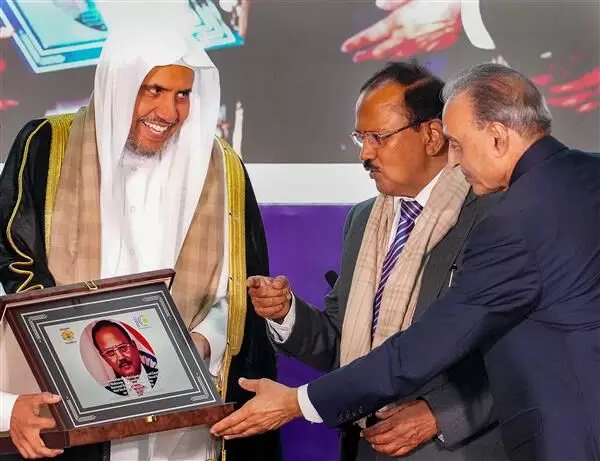Epistle of harmony
The India visit of noted Saudi Arabian Islamic scholar Abdulkarim Al-Issa has left a profound message for interfaith harmony and peaceful coexistence

Noted International Islamic Scholar and Religious Cleric, Mohammad bin Abdulkarim Al-Issa, Secretary General of the Muslim World League and President of the International Islamic Halal Organisation, paid a five-day fruitful visit to India in the middle of this month, casting a profound spell on various segments of the people.
While in India, Mohammad bin Abdulkarim Al-Issa visited the well-known Hindu Akshardham temple in New Delhi and held extensive interactions with Hindu priests, charming them with his in-depth knowledge of all religions. He added that India is a great example of unity and diversity. While holding interactions with the Hindu religious leaders at the temple, Al-Issa extended an invitation to them to visit Saudi Arabia. He stressed the need for world religious harmony, and his audience was duly impressed by his understanding of the Hindu religion. The distinguished visitor categorically stated that the terrorist organisations giving a bad name to Islam do not represent anyone except themselves, and they have no religion or country.
Al-Issa also paid a visit to the medieval-era Mosque, the Jama Masjid in New Delhi, and interacted with the chief cleric and a large number of Muslims. The highlight of his speech was that Islam makes it mandatory to mind the importance of geography and diversity of people. According to Indian Islamic Scholars of eminence, Al-Issa has left behind a deep impact of the message for interfaith harmony during his conversations.
Earlier on July 11, he addressed a large gathering at the India Islamic Cultural Centre (IICC) in New Delhi. This event was hailed as a great success because of the presence of a variety of interesting people, including religious scholars, university students, faculty, cultural luminaries, and people from almost all walks of life. Al-Issa, during his address, hailed India as a role model of peaceful coexistence among religious communities.
The visiting dignitary shared the stage with the Indian National Security Advisor (NSA), Ajit Doval. Their collective presence infused the gathering with precious insights. Together, they not only celebrated the diversity and coexistence of different religious beliefs in India but also emphasised the significance of fostering unity and understanding.
Al-Issa elucidated the inescapable nature of diversity, encompassing differences in languages, ethnicities, and modes of thought. Moreover, he articulated that such a perspective was the only way to build positive relations among nations, religious communities, and ethnic groups. Al-Issa observed that even though India is a Hindu-majority country, its tradition and Constitution provide for peaceful coexistence for all communities. Citing his personal friendships with some Hindu religious figures, he underlined that their ultimate aim is to promote peace in society and in the world at large. Al-Issa averred with satisfaction that the Muslim component in Indian society is proud of the nation and its Constitution, emphasising its role in preserving harmony and cooperation among the diverse Indian communities. He stressed that traditional Indian wisdom has significantly enriched humanity, especially in promoting peaceful coexistence. In his view, India’s model of coexistence could serve as a blueprint for global harmony.
The Islamic scholar proclaimed his admiration for India, identifying it as an example of openness and commonality in objectives. He said India had a long and successful history of diversity and peaceful coexistence.
Responding to Al-Issa, India’s NSA, who has led numerous peace missions in different parts of the world, commended Al-Issa’s visionary thought and clear message that communities must live in peace.
NSA Ajit Doval also elaborated on the Saudi jurist’s pitch by highlighting India’s unique inclusive and syncretic tradition that would seamlessly weave with the global quest for harmony. He recalled Islam having arrived in India in the 7th century CE during the life of Prophet Mohammad and gradually finding a new home in the subcontinent. Over the centuries, it developed a unique syncretic tradition that is deeply rooted in the ethos of Indian cultural life. He further said that the deep spiritual content of Hinduism and Islam brought the people together and helped in bringing about a social and intellectual understanding of each other, giving rise to a distinct and vibrant expression of peace and harmony, notwithstanding the vagaries of political ups and downs.
Furthermore, Doval highlighted that India was carrying forward the theme of global inclusiveness during its presidency of the G-20. As the G-20 President, India ideated the slogan for the Summit as ‘One Earth, One Family, One Future’. It is only with mutual trust and cooperation among nations, civil societies, religions, and people of the world that security, stability, sustainable development, and a dignified life for all citizens can be ensured.
On the whole, Al-Issa’s India visit has certainly helped in the creation of further synergy between different faiths in India. The Indian initiative to invite this Islamic scholar of international repute, enabling him to freely interact with a diverse stratum of people, was indeed a positive move. Saudi Arabia, too, reciprocated in good measure to strengthen its bilateral ties with India at this critical juncture when the world is in turmoil. Taking the cue from the outcome of this successful visit, more international scholars belonging to different faiths merit similar visits for free and candid exchange of ideas for a more vibrant, harmonious, and peaceful global order.
The writer is an IPS officer, Adviser NatStrat, security analyst and a former National Security Advisor in Mauritius. Views expressed are personal



